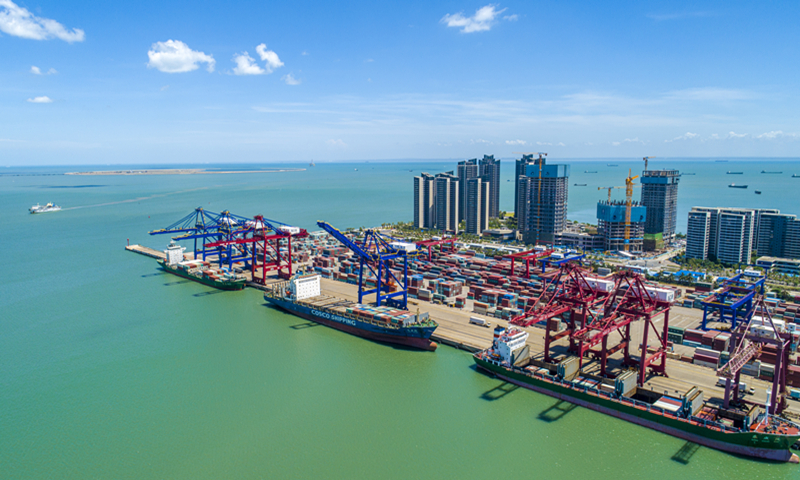
Ships load and unload containers at Haikou Port in South China's Hainan Province on Monday. As the main section of Haikou Port, the Xiuying Port can handle about 4.06 million tons of cargo annually, and about 800,000 units of 20-foot equivalent containers. In 2020, Hainan's foreign trade reached 93.3 billion yuan ($14.5 billion), up 3 percent year-on-year, per customs data. Photo: VCG
China’s Hainan free trade port (FTP) is going to implement a different tax policy, including simplifying and combining different taxes and tax refunding for goods from Chinese mainland, according to a draft of Hainan Free Trade Port Law which is scheduled to be reviewed for the third time next week.
Simplifying the tax system is one of the key segments in building FTP in Hainan, said Zang Tiewei, a spokesperson for the Legislative Affairs Commission of the National People’s Congress (NPC) Standing Committee, at a press conference on Friday.
When the FTP completes construction and starts operation as a whole, taxes and fees such as value-added tax, consumption tax, vehicle purchase tax, urban maintenance and construction tax and education surcharge will be combined, and sales tax will be levied in the retail of goods and services. The tax simplification work will continue afterward.
The draft law also made clear about the arrangements of tax refunding for goods from Chinese mainland. Value-added tax and consumption tax will be refunded for goods from the mainland to avoid unbalanced tax burdens, and to make sure there is a fair competition of goods from the mainland and from overseas.
The draft also added provisions about establishing policy and institutional systems for the FTP through a series of steps, to realize free and convenient exchange of trade, investment, cross-border capital, personnel and transportation, as well as to achieve secure and orderly data transmission.
It also improved relevant regulations on ecological and environmental protection, including making an ecological environment access list, preventing alien species invasion and achieving sustainable development.
The construction of the FTP in South China’s Hainan Province, China’s largest special economic zone, is a major move for the country to boost high-level opening up, and a practical action for supporting economic globalization and building a community with a shared future for mankind.
A total of 11 key industrial parks are being developed into demonstration zones for the construction of the FTP, Xinhua News Agency reported. In 2020, the 11 key parks earned a total business revenue of 506.78 billion yuan ($79.36 billion), up 49.8 percent year-on-year, and a total tax revenue of 39.54 billion yuan, up 13.3 percent year-on-year.
Global Times




